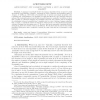54 search results - page 5 / 11 » Some properties of the disjunctive languages contained in Q |
126
Voted
CORR
2011
Springer
14 years 8 months ago
2011
Springer
In the algebraic theory of codes and formal languages, the set Q of all primitive words over some alphabet Σ has received special interest. With this survey article we give an ove...
132
click to vote
SIROCCO
2010
15 years 2 months ago
2010
We consider asynchronous message-passing systems in which some links are timely and processes may crash. Each run defines a timeliness graph among correct processes: (p, q) is an e...
114
click to vote
FLAIRS
2007
15 years 3 months ago
2007
Reasoning about preferences is a major issue in many decision making problems. Recently, a new logic for handling preferences, called Qualitative Choice Logic (QCL), was presented...
ECAI
1992
Springer
15 years 5 months ago
1992
Springer
We consider non-Horn Deductive Data Bases (DDB) represented in a First Order language without function symbols. In this context the DDB is an incomplete description of the world. ...
107
click to vote
SIAMCOMP
1998
15 years 20 days ago
1998
A language is L-printable if there is a logspace algorithm which, on input 1n, prints all members in the language of length n. Following the work of Allender and Rubinstein [SIAM J...

